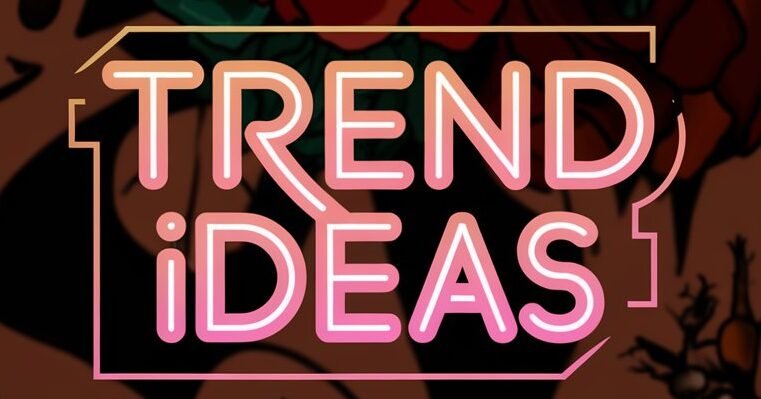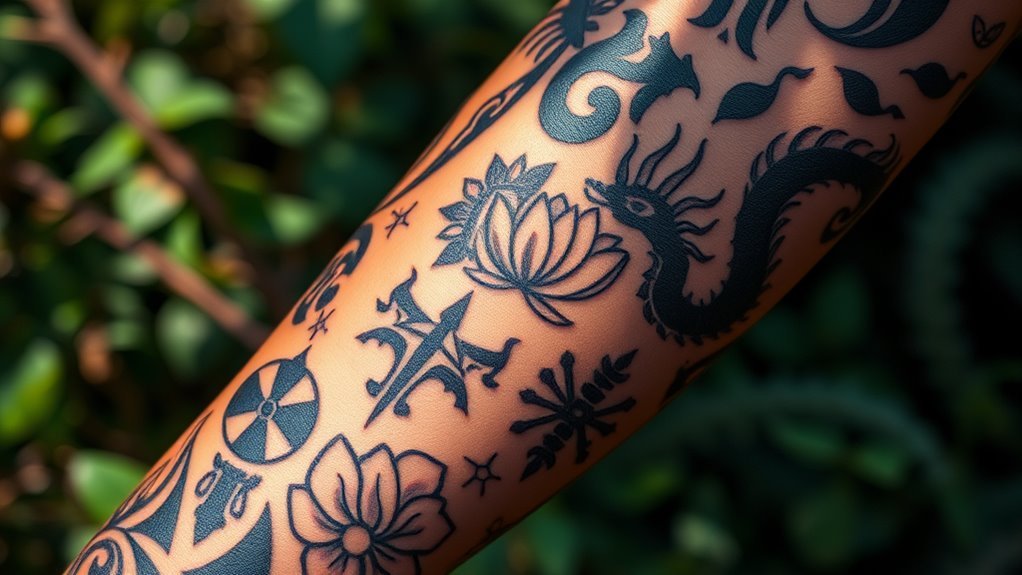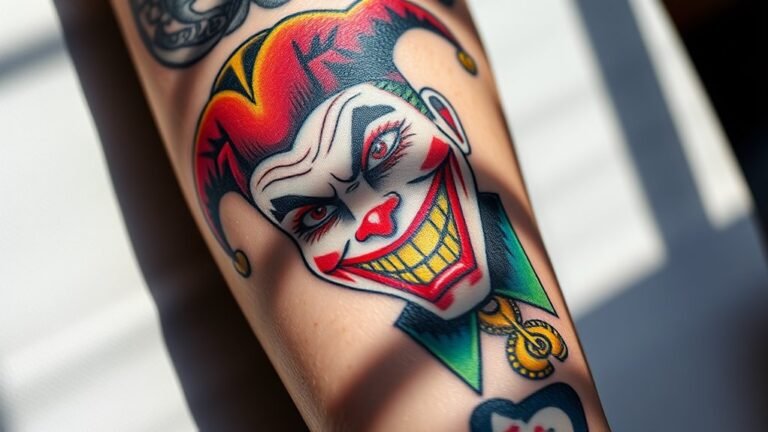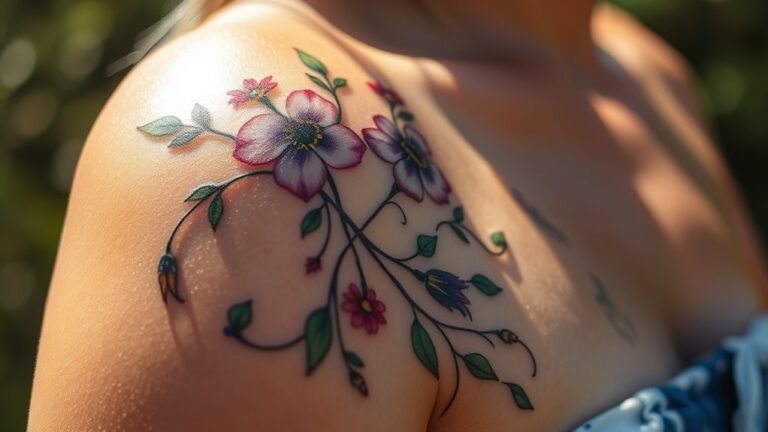Tattoo Meaning and Symbolism
Tattoos often serve as a canvas for personal expression, reflecting deeper meanings tied to culture, identity, and life experiences. Each design can reveal something significant about your values or beliefs, intertwining your story with broader human narratives. As you consider the stories behind various tattoos, it is crucial to explore how these symbols resonate across different cultures and eras. What influences your choices, and how do they connect to the larger tapestry of tattoo symbolism?
In a Nutshell
- Tattoos symbolize identity and personal expression, reflecting individual beliefs and experiences.
- Cultural symbolism in tattoos varies globally, often marking significant life events or community belonging.
- Common designs like dragons, hearts, and anchors carry specific meanings representing strength, love, and stability.
- Tattoos serve as personal narratives, capturing unique journeys, emotions, and milestones in one's life.
- Spiritual and religious tattoos express faith and connection to the divine, often featuring symbols or personal mantras.
The Historical Significance of Tattoos
Throughout history, tattoos have served as powerful symbols of identity, culture, and personal expression, often reflecting the values and beliefs of the societies that embraced them.
In many ancient practices, tattoos were more than mere decorations; they signified status, achievements, or rites of passage. Consider the tribal traditions of indigenous peoples, where intricate designs often marked belonging to a specific community.
These markings fostered connection among individuals, creating a shared sense of identity. As you explore the rich tapestry of tattoo history, you'll see how these symbols transcended mere aesthetics, serving as vital narratives of cultural heritage.
Ultimately, understanding this historical significance can deepen your appreciation for tattoos as expressions of personal and collective identity.
Cultural Symbolism in Tattoo Art
Tattoos not only carry historical significance but also embody rich cultural symbolism that varies widely across different societies. You may find tribal influences manifest in designs that express identity, spirituality, or lineage.
For many cultures, tattoos serve as rites of passage, marking significant life events or achievements. However, it's essential to navigate the fine line between appreciation and cultural appropriation.
When you choose a design rooted in another culture, reflect on its meaning and context. Understanding the origins fosters respect, creating a deeper connection to the art.
This awareness not only enhances your personal experience but also honors the traditions from which these symbols arise, fostering a sense of belonging to a larger narrative that transcends individual expression.
Common Tattoo Designs and Their Meanings
Artistic expression through tattoo designs often reveals deeper meanings that resonate with personal beliefs and experiences. Each design carries its own weight, echoing stories and aspirations.
Here are three common tattoo designs and their meanings:
- Dragon Tattoos: Symbolizing strength and wisdom, they represent the power within you to overcome obstacles.
- Heart Tattoos: These embody love and passion, often signifying deep connections with others or self-love.
- Anchor Tattoos: They convey stability and hope, reminding you of your roots and guiding you through storms.
Whether it's a feather, lotus, rose, skull, or infinity tattoo, each serves as a reminder of who you're and what you value, creating a sense of belonging in a shared human experience.
Personal Narratives: Tattoos as Life Stories
When you look at a tattoo, you're often witnessing a personal narrative etched into skin, reflecting significant moments, emotions, or transformations in someone's life.
Each tattoo tells unique tattoo stories, capturing personal journeys and experiences. Perhaps it's a symbol of resilience after overcoming hardship or a tribute to a loved one lost.
These markings connect you to the wearer's journey, inviting you to understand their struggles, triumphs, and growth. They serve as visual reminders of who they're and where they've been, fostering a sense of belonging among those who share similar experiences.
Tattoos aren't just art; they're powerful expressions of identity, allowing you to glimpse the rich tapestry of human experience woven into every design.
Spiritual and Religious Tattoos
While many people choose tattoos to express personal stories, spiritual and religious tattoos explore deeper into the domains of belief and connection to the divine.
These tattoos often serve as markers of your spiritual journey, representing profound values and sacred symbols.
Here are some common themes you might encounter:
- Religious Icons: Crosses, om symbols, and mandalas signify faith and devotion.
- Nature Elements: Trees, water, and mountains symbolize the connection to the universe and its energies.
- Personal Mantras: Phrases or words that inspire spiritual growth and resilience.
The Role of Tattoos in Modern Society
Tattoos have evolved from taboo symbols of rebellion to mainstream expressions of identity and culture. In modern society, you'll notice how tattoo trends reflect shifting societal perceptions.
Once associated with outlaws and misfits, tattoos now signify personal stories, beliefs, and community ties. People, like you, often seek belonging through this art form, using ink to express individuality while connecting with others who share similar experiences.
As acceptance grows, workplaces are becoming more lenient about visible tattoos, indicating a broader cultural shift. This new visibility allows you to explore and embrace your unique narrative, fostering an environment where diverse identities are celebrated.
Ultimately, tattoos serve as a powerful medium for self-expression and connection in today's world.
Healing and Transformative Tattoos
As you explore the world of healing and transformative tattoos, you'll discover how these artworks can serve as powerful catalysts for personal growth and emotional recovery.
Many people choose these tattoos to symbolize their journeys, embracing healing symbols that resonate with their experiences.
Consider the following:
- Personal Empowerment: Each design reflects your resilience and ability to overcome challenges.
- Emotional Release: Transformative art can express feelings that words often fail to capture, helping you process trauma.
- Connection to Community: By sharing your story through tattoos, you foster a sense of belonging with others who relate to your journey.
These tattoos aren't just ink; they embody your narrative, marking a significant transformation in your life.
Nature-Inspired Tattoos and Their Symbolism
When you explore the domain of nature-inspired tattoos, it quickly becomes clear how deeply these designs resonate with personal identity and the environment.
Floral motifs and botanical designs often symbolize growth and renewal, while animal symbolism connects you to the wildlife representations that inspire your spirit.
Using natural elements and organic patterns, these tattoos can convey environmental messages, urging respect for nature. Earth tones further enhance the connection, grounding your identity in the environment.
Seasonal themes, such as blossoms in spring or falling leaves in autumn, reflect life's cyclical nature.
Celestial bodies, like the sun and moon, remind you of the universe's vastness and your place within it, fostering a sense of belonging to something greater.
The Impact of Color in Tattoo Meanings
Colors play a significant role in the interpretation of tattoo meanings, shaping how designs resonate with individual emotions and cultural symbolism. Understanding color psychology and symbolism can deepen your connection to your tattoo.
Here are three key aspects to evaluate:
- Cultural Perceptions: Different cultures attribute varying meanings to colors. For instance, red often symbolizes love in Western cultures but may represent luck in others.
- Personal Preferences: Your favorite colors can reflect your personality and experiences, making your tattoo uniquely yours.
- Color Combinations and Trends: Popular color trends might influence your choices, blending personal significance with contemporary styles.
Frequently Asked Questions
Can Tattoos Be Removed, and How Effective Is the Process?
Yes, tattoos can be removed through laser treatments. The effectiveness varies based on ink type and skin tone. You should consult a professional to determine the best approach for your unique situation and desired outcome.
Are There Age Restrictions for Getting a Tattoo?
Yes, there are age restrictions for getting a tattoo. Most places require you to be at least 18, but some allow younger individuals with parental consent, reflecting varying legal requirements across different regions.
What Should I Consider Before Getting My First Tattoo?
Before getting your first tattoo, consider the design significance and your personal motivation. Reflect on how it resonates with your identity, ensuring it represents something meaningful that you'll cherish as part of your journey.
How Do I Choose a Reputable Tattoo Artist?
To choose a reputable tattoo artist, review artist portfolios for their style, and read client reviews for insights on professionalism and hygiene. Trust your instincts; a good fit guarantees a positive experience and lasting artwork.
What Are the Potential Health Risks Associated With Tattoos?
When considering tattoos, you should be aware of potential health risks. Tattoo infections and allergic reactions can occur, leading to complications. It's essential to choose a skilled artist and guarantee proper aftercare to minimize these risks.







